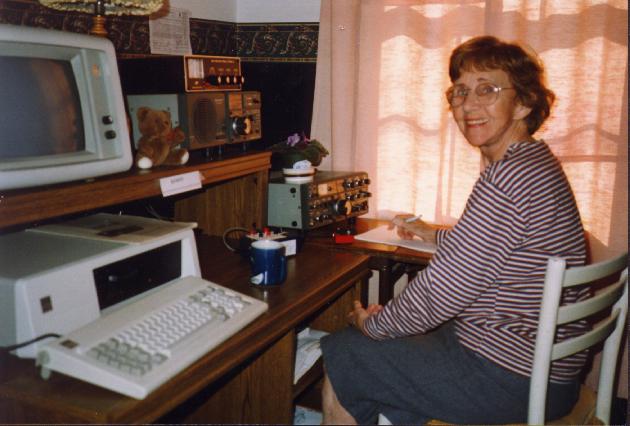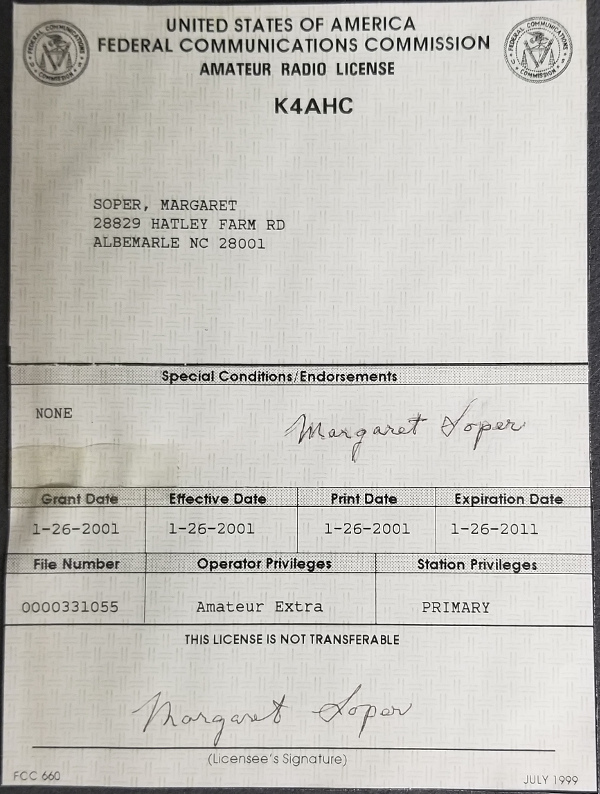The picture above is of mom’s first station with a Kenwood TS830S licensed as KF4OSV .
Above is the extra class license my mother earned at 79.
I spent most of my life thinking I got my best brain genes from my dad, but late in life I lost all certainty about that. Mom took up amateur radio after I unsuccessfully tried to get my dad interested in 1995 (he’d built custom gear for his best friend’s amateur station after WWII and said he was bored with it.) When mom expressed interest I put a super regenerative kit receiver at her house with a long wire antenna over a tree and she started listening. She started studying for an amateur license and practicing morse code too, using a practice gadget I made her. She got her novice license (including 5WPM morse code) around 1996 at age 75. I set her up with a Kenwood TS830 and 80/40m band trap dipole as a simple but effective 100 watt station. We made a contact on 40 meters CW (morse code) with me in Apex and her 100 miles west and exchanged QSL cards. I was never the slightest bit competent with that mode and only later used CW with software assistance during the occasional contest over the years. Little did I know at the time that my mom didn’t stop at 5wpm.
Mom grew up in the outskirts of Manchester, England and was working in a factory in 1943 during WWII when my dad met, courted and married her, taking her back to the Norwich area and they shared a little apartment a bicycle ride away from the dad’s B24 base. She worked in the base PX (general store). After the war they lived in Ann Arbor and Ypsilanti, Michigan and mom had other jobs here and there until I showed up in 1950. Mom was a housewife from that point on, except for bit of volunteer work at area hospitals. In the 60s my dad became a devout Christian, and as a side effect of that, implemented a conservative agenda for my mother as his “helpmate”, etc, and this stymied her desire to get out and do things independently as my brother and I were in our teens and soon off to universities. I didn’t have the sense to help her convince dad that his soul would make it OK if she was allowed to develop a life outside the house too. Dad had his church buddies and model airplanes and that club, but mom was extremely shy and only had a few close friends and her books. She read a lot, but nothing technical. Absolutely nothing technical until she was 74 years old.
So, imagine my surprise when, in the middle of the Worked All Europe (WAE) contest in 1997 as my buddy Jim WW4M and I were competing with a Multi/Single station, my wife Jenny stuck her head in the ham shack and said “your mom is on the phone and wants to tell you something”. Something about my wife’s tone made it clear this was urgent. I just pulled the headphone/mike off my head between one “QRZ” and another, handed it to Jim and went to the phone where my mother proudly announced “I got my general class license”. I was disoriented. This was before FCC license restructuring in 2000 and so it included a 13wpm morse code test and in my mind the theory in the general exam was beyond her. I wanted to ask how she did that, but could only enthusiastically congratulate her. From that point, with callsign KF4VMT and using the station upgrade I’d gotten her (transceiver upgraded to a TS450 and folded 10-15-20m quad on the roof with a little rotator), she started chatting with people in Europe, Central and South America, and kept studying. It took two years of study before she took and passed the advanced class exam, by far the hardest of the series. She never allowed me to help her and I have no memory of explaining anything technical to her, but she did get a bit of help from the guys in a an amateur radio club she’d joined.
OK, you old men out there that know what these tests were like in the “good old days”: yes, this was probably easier than driving 50 miles and sitting in front of an FCC examiner and drawing schematics of superhet receivers. However, relative to my mother’s prior background, words cannot describe how impressed I was by this accomplishment. Mom kept right on studying until she took and passed the final, extra class exam and the license above reflects that happy day in 2001.
We have a shoe box full of mom’s QSL cards documenting the hundreds of chats she shared with friends made on the radio, and with the cards there are many personal notes. One letter included with his QSL card by a Russian amateur is especially touching. But rag chewing is boring, I can only imagine mom saying to herself. While studying for the advanced license she started contesting and took part in a number of events before her hearing let her down and took this hobby from her when she was around 82.
The one other thing to share is that my mother was an optimist. Despite an extremely stressful stretch in Montgomery, Alabama while my dad worked rotating shifts building and maintaining one of the SAGE computers as an IBM engineer and my brother and I tried to survive being the only yankees on the elementary school playground, she was optimistic. Despite the difficulty of adapting to the very different culture and familial patterns she was abruptly subjected to with her move to the US, and the whole church experience that simply stepped on her personal beliefs and preferences for how she wanted to live, she stayed cheerful, with a sunny disposition right up to the point vascular dementia began to rob her from us. Ironically, her memory of amateur radio was one of the very first things to go, so it seemed apropos to capture memories of that amazing part of her life as a tribute.


